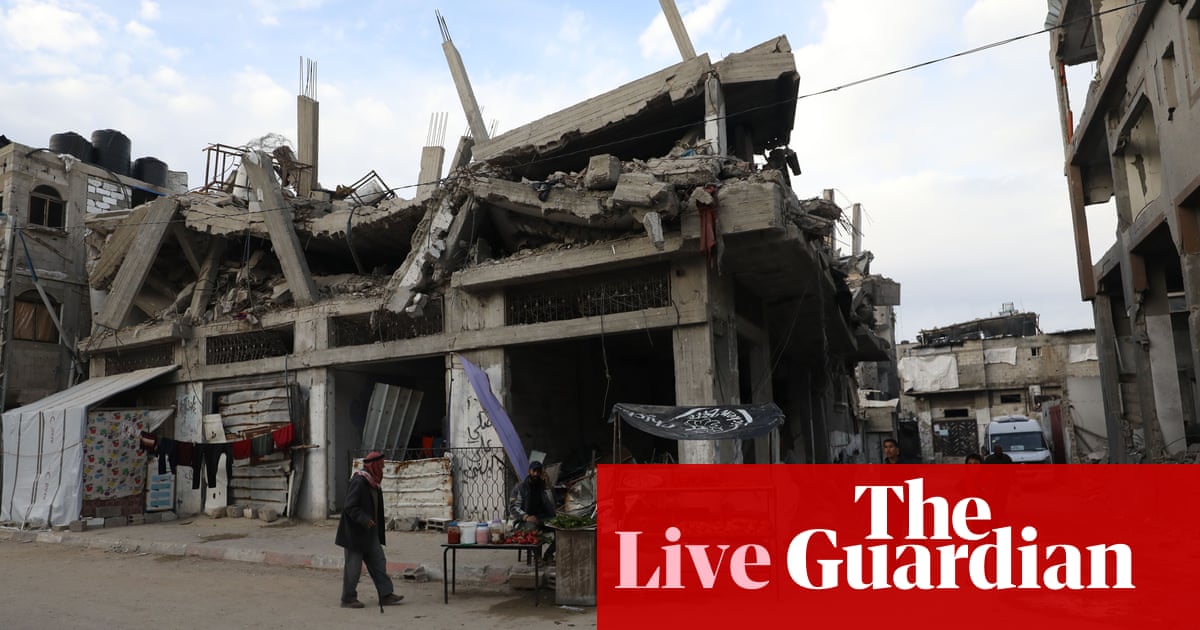Hamas leader says disarming ‘a red line’ amid Gaza truce impasse
Hamas leader Sami Abu Zuhri told AFP Tuesday that disarming is a red line for his movement and other Palestinian militant groups in negotiations to extend the fragile Gaza ceasefire.
“Any talk about the resistance’s weapons is nonsense. The resistance’s weapons are a red line for Hamas and all resistance factions,” Abu Zuhri said shortly after Israeli Foreign Minister Gideon Saar demanded the “full demilitarisation” of Gaza to proceed to the second stage of the January truce.
Key events
Israel says aid has become ‘number one source of revenue’ for Hamas
Israel’s top diplomat charged Tuesday that humanitarian aid had become the “number one source of revenue” for Hamas, as he defended his government’s decision to block all deliveries to Gaza.
The head of the UN agency for Palestinian refugees (UNRWA), Philippe Lazzarini, said the Israeli move “threatens the lives of civilians exhausted by 16 months of brutal war”.
Israel announced on Sunday that it would halt the entry of aid into Gaza after negotiations over next steps in a fragile January 19 ceasefire in the Palestinian territory hit an impasse.
“Humanitarian aid became the number one source of income of Hamas in Gaza,” Foreign Minister Gideon Saar said. “With that money they use for terror to restore their abilities and to get more young terrorists into their organisation.”
The UNRWA chief called on Israel to allow the aid surge agreed under the ceasefire to continue.
Foreign Minister Gideon Saar said on Tuesday Israel was ready to proceed to the second phase of the Gaza ceasefire deal, as long as Hamas was ready to release more of the 59 hostages it is still holding.
“We are ready to continue to phase two,” Saar told reporters in Jerusalem as Arab leaders prepared to meet in Cairo to discuss a plan for ending the war permanently.
“But in order to extend the time or the framework, we need an agreement to release more hostages.”
Saar denied that Israel had breached the ceasefire agreement by not moving ahead to stage two negotiations. He said there was “no automaticity” between the stages and he said Hamas had itself violated the agreement to allow aid into Gaza by seizing most of the supplies itself.
“It is a means to continue the war against Israel. It’s today the major part of Hamas income in Gaza,” he said.
Israeli drone strike killed one, Lebanese media state
Lebanese official media said an Israeli strike on a vehicle in the south on Tuesday killed one person, the latest deadly raid amid a ceasefire between Israel and Hezbollah.
“An enemy drone launched a strike” targeting a vehicle in Tyre district, killing one person, the National News Agency said.
It published an image of a burning, mangled car.
A November 27 truce agreement largely halted more than a year of hostilities between Hezbollah and Israel, including two months of full-blown war during which Israel sent in ground troops.
Details of Egypt’s £42bn reconstruction plan for Gaza revealed
Egypt’s reconstruction plan for Gaza will cost $53bn (£42bn), according to a copy of the document seen by Reuters on Tuesday.
The 112-page plan includes maps showing how Gaza’s land would be re-developed and dozens of colourful AI-generated images of housing developments, gardens and community centres.
The plan includes a commercial harbour, a technology hub and beach hotels.
Lebanese official media said Israel carried out a drone strike in the south on Tuesday, the latest such raid amid a ceasefire between Israel and Hezbollah.
“An enemy drone launched a strike” in Tyre district, the National News Agency said, publishing an image of a burning, mangled car.
An Arab summit draft communique on Tuesday adopted an Egyptian plan for Gaza’s future and called on the international community and financial institutions to provide support for the plan quickly.
Hamas leader says disarming ‘a red line’ amid Gaza truce impasse
Hamas leader Sami Abu Zuhri told AFP Tuesday that disarming is a red line for his movement and other Palestinian militant groups in negotiations to extend the fragile Gaza ceasefire.
“Any talk about the resistance’s weapons is nonsense. The resistance’s weapons are a red line for Hamas and all resistance factions,” Abu Zuhri said shortly after Israeli Foreign Minister Gideon Saar demanded the “full demilitarisation” of Gaza to proceed to the second stage of the January truce.
Lebanon’s president ended a visit to Saudi Arabia on Tuesday where he discussed regional affairs with the kingdom’s crown prince after which both countries said Israeli troops should withdraw from south Lebanon and only the Lebanese state should have weapons.
The visit by Joseph Aoun, the first by a Lebanese head of state to the oil-rich kingdom in eight years, improves ties between the two countries that have been cold for years over Iran’s influence in Lebanon. Aoun was received Monday night by Saudi Crown Prince Mohammed bin Salman at Yamama Palace in the capital, Riyadh, where they discussed the situation in Lebanon and boosting relations between the two countries, according to the state-run Saudi Press Agency.
Aoun’s visit comes after the Iran-backed Hezbollah suffered severe blows during a 14-month war with Israel that left many of its top political and military officials dead and ended with a U.S.-brokered ceasefire in late November. Israel withdrew many of its troops from Lebanon in mid-February but left five posts inside Lebanon, which Lebanese officials have described as a violation of the ceasefire deal.
A joint statement issued after the summit said that only state institutions in Lebanon should have the right to have arms and that the Lebanese army should be supported. It added that Israel should withdraw from all parts of Lebanon.
Israel says it needs agreement on freeing hostages to extend Gaza ceasefire deal
Israeli Foreign Minister Gideon Saar said on Tuesday Israel was ready to continue to the second phase of the Gaza ceasefire deal but needs an agreement on the release of hostages held by Hamas to extend the framework.
Saar accused the Palestinian militant group of using aid to continue fighting Israel, saying this could not continue.

Julian Borger
Jordanian ambulances crossed into Gaza through the Keren Shalom gate shortly before 11am this morning to collect 30 wounded and sick children – part of a medevac plan to transfer 2000 child patients in most immediate need of medical attention to Amman.
Four other children, the most urgent cases, were due to be flown out by Jordanian Air Force helicopters. The Keren Shalom crossing, the only route for aid into Gaza during the ceasefire, was quiet except for a few Israeli soldiers and the Jordanian vehicles.
Benjamin Netanyahu blocked access for humanitarian assistance on Sunday and nothing has passed through Kerem Shalom since then.
Iran said Turkey’s criticism of its foreign policy risked worsening ties between the neighbouring countries, after Islamist rebels allied with Ankara ousted Syria’s Bashar al-Assad.
In an interview with Al Jazeera in February, Turkish Foreign Minister Hakan Fidan said Iran risked plunging the Middle East into “disorder”.
Iran leads the so-called “axis of resistance” against Israel, which includes Hamas in the Palestinian territories, Hezbollah in Lebanon, the Huthi rebels in Yemen and armed groups in Iraq.
On Monday, Iran hit back, with Assistant Minister of Foreign Affairs Mahmoud Heydari warning against “false statements and unrealistic analysis that could lead to differences and tensions”.
Heydari made his remarks during what Tehran described as a meeting with Turkey’s ambassador in Iran, Hicabi Kirlangic.
Israeli minister who supports annexing occupied West Bank to visit US
Israel’s far-right Finance Minister Bezalel Smotrich, who supports the annexation of the occupied West Bank, said on Tuesday that he was travelling to the United States for a brief visit.
“The goal of this visit is to strengthen economic cooperation between Israel and the United States… and deepen the strategic alliance between our two countries,” Smotrich wrote on social media platform X.
His trip comes with US President Donald Trump expected to announce whether to back the annexation of all or part of the West Bank, a Palestinian territory occupied by Israel since 1967.
Smotrich, an ultranationalist settler whose support is key to Prime Minister Benjamin Netanyahu’s parliamentary majority, said he would meet US Treasury Secretary Scott Bessent, as well as other US government officials.
He has said on several occasions since Hamas’s October 7, 2023 attack triggered war that Israel should push for Palestinians to leave Gaza and the West Bank, and that it should take control of them.
The first phase of the ceasefire in Gaza expired over the weekend – and now, the only thing stopping the resumption of Israel’s assault on the territory is the will of Benjamin Netanyahu. That is the bleak reality for the hostages still alive in Gaza, and the Palestinian civilians there who were subjected to a new aid embargo on Sunday. Last night, the Israeli government was reported to be planning to ratchet the blockade up further – with a programme of measures referred to as the “hell plan”.
In today’s newsletter: With talks stalled, aid blocked and a truce in question, can the path to peace get back on track? Read our full breifing for Tuesday here:
Israel this week introduced what it said was a new US ceasefire plan – different from the one it agreed to in January – and is trying to force Hamas to accept it by imposing a siege on the Gaza Strip, AP reporters explain.
Prime minister Benjamin Netanyahu referred to it as the “Witkoff proposal,” saying it came from U.S. President Donald Trump’s Mideast envoy, Steve Witkoff. But the White House has yet to confirm that, saying only that it supports whatever action Israel takes.
Netanyahu’s remarks came a day after the first phase of the negotiated ceasefire ended, with no clarity on what would come next since the agreement’s second phase has not yet been hammered out.
The new plan would require Hamas to release half its remaining hostages – the militant group’s main bargaining chip – in exchange for a ceasefire extension and a promise to negotiate a lasting truce. Israel made no mention of releasing more Palestinian prisoners – a key component of the first phase.
Hamas has accused Israel of trying to sabotage the existing agreement, which called for the two sides to negotiate the return of the remaining hostages in exchange for more Palestinian prisoners, a full Israeli withdrawal from Gaza and a lasting ceasefire. But no substantive negotiations have been held.
On Sunday, Israel halted all food, fuel, medicine and other supplies to Gaza’s population of 2 million people and vowed “additional consequences” if Hamas did not embrace the new proposal.
Arab leaders are meanwhile finalizing a separate plan for postwar Gaza to counter Trump’s suggestion that its population be relocated so it can be transformed into a tourist destination.
But all bets are off if the war resumes.
Arab leaders gather to hash out alternative to Trump’s Gaza plan
Arab leaders are gathering in Cairo on Tuesday to discuss an alternative to a widely condemned plan from US President Donald Trump to assume control of war-battered Gaza and displace its Palestinian population.
The Arab League summit on the territory’s reconstruction comes a day after Israeli prime minister Benjamin Netanyahu again gave his backing to Trump’s plan, calling it “visionary and innovative”.
Palestinians, along with the Arab world and many of Israel and the United States’ partners, have condemned Trump’s proposal, rejecting any efforts to expel Palestinians in Gaza.
UN estimates have put the cost of Gaza’s reconstruction at more than $53bn (£42bn), after a devastating war triggered by Hamas’s unprecedented October 7, 2023 attack on Israel.
